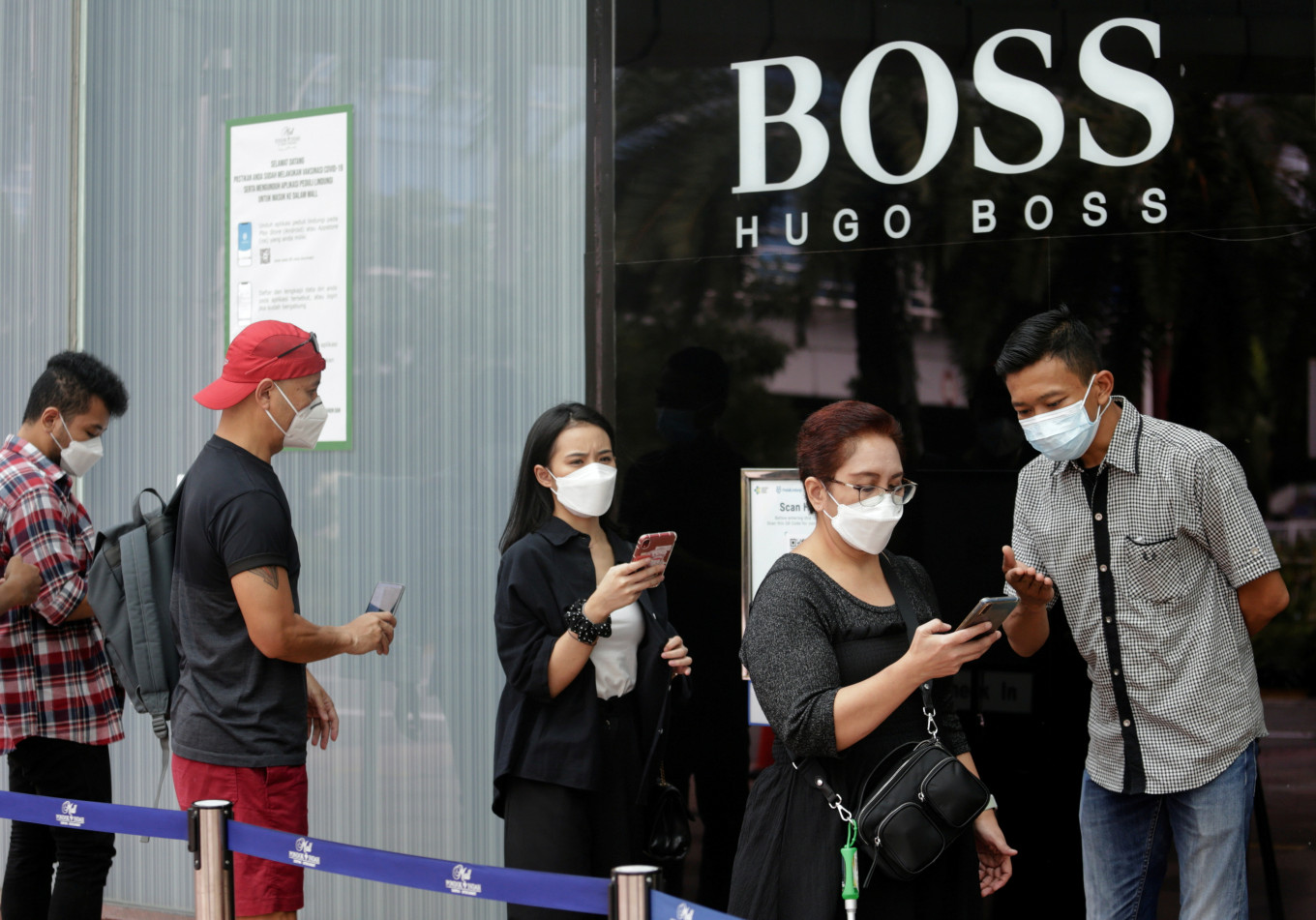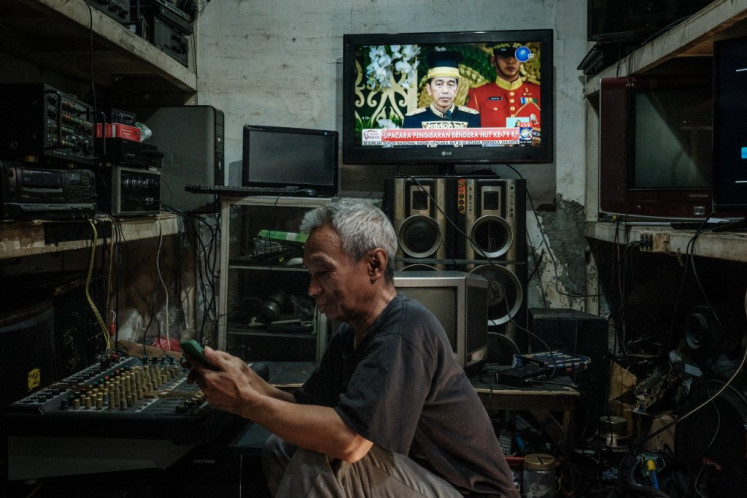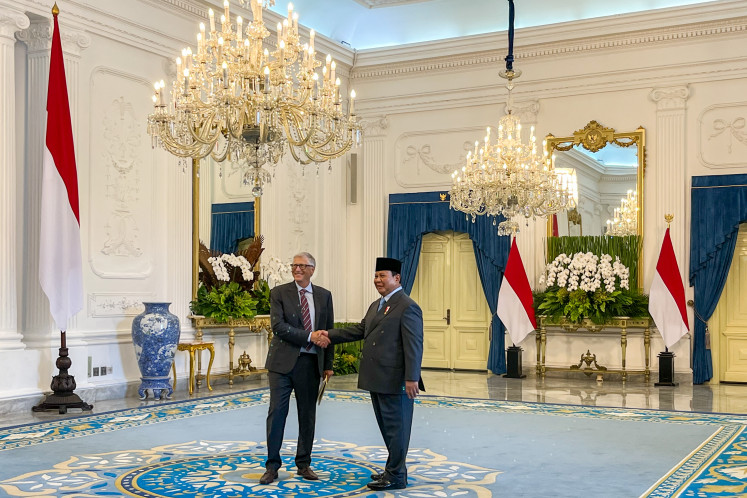Indonesia braces for the third wave of COVID-19
Stronger central, local government coordination needed
Change text size
Gift Premium Articles
to Anyone

H
ealth authorities and hospitals across the archipelago are bracing for a potentially devastating "third wave" of COVID-19 infections, as public mobility increases amid the loosening of COVID-19 restrictions and a dip in new cases.
Epidemiologists have warned the third wave may strike Indonesia in December or January, citing a slow vaccination rate and the expected increase in public mobility during the year-end holidays.
National COVID-19 task force spokeswoman Siti Nadia Tarmizi said the Health Ministry was currently trying to accelerate vaccine rollouts in regions with higher risk of COVID-19 infections, — such as urban agglomeration areas and provincial capitals — to anticipate an uptick in COVID-19 infections.
"We are aiming to jab 70 percent of people living in agglomeration areas in the islands of Java and Bali with the first dose by the end of September. We are also aiming to reach 70 percent vaccination coverage in provincial capitals outside of Java and Bali by October," Siti told The Jakarta Post on Wednesday.
However, as per Wednesday, out of eight urban agglomeration areas in Java and Bali, only Bali's Denpasar and its satellite cities had reached vaccination coverage of over 70 percent for the first dose.
Previously, Coordinating Economic Minister Airlangga Hartarto said that the government planned to provide free and paid booster shots for the public to weather a third wave of infections.
‘Second wave’ lessons
Aside from ramping up vaccine rollouts, Siti said, the government was also planning to tighten border controls and strengthen its tracing and tracking capacity.
Health authorities at the regional level have also set up extra measures to face the threat of a third wave.
In Jakarta for example, the region with the highest vaccination rate in the country with 86 percent of its targeted population fully vaccinated, authorities are currently planning to jab all the remaining 2.3 million eligible residents to anticipate the third wave.
"Although we have surpassed the government’s vaccine coverage targets, not all Jakartans are fully inoculated yet. So we'll ask the help of RT and RW heads to encourage more residents to get COVID-19 shots and accelerate the city's vaccine rollouts," Jakarta Health Agency head Widyastuti said on Tuesday as reported by antaranews.com.
Meanwhile, West Kalimantan Health Agency head Harrison said that the province had prepared oxygen concentrators in various hospitals in the province and a scheme to import oxygen supply from neighboring Malaysia to prevent shortages ahead of any third wave.
"We need to learn from our shortcomings [during the second wave], when hospitals were overwhelmed with patients and COVID-19 medicines and oxygen supply were scarce. If we're not careful the same thing will happen again," Harrison said on Friday, as reported by kompas.com.
Indonesian Hospital Association (PERSI) secretary-general Lia Partakusuma said that hospitals across the country had been preparing for the third wave by stockpiling essential medical items, such as oxygen tanks, medicines, personal protective equipment and COVID-19 test kits.
"We're also training our health workers with the latest information on COVID-19 and strengthening our COVID-19 surveillance system, including by taking samples from patients for whole genome sequencing,” Lia said on Friday.
“We have also improved our air-ventilation systems, patient-safety protocols and medical-waste management," she added.
Third wave ‘inevitable’
Indonesia's daily cases have fallen from about 50,000 during the height of the Delta-fueled second wave in July to under 3,000 in the past week.
Last week, the daily virus reproduction number (Rt) fell below 1 while the test positivity rate also dropped below 2 percent, indicating that the outbreak was under control.
As infections stabilized, the government has recently ended the implementation of level 4 multi-tiered public activity restrictions (PPKM) — the strictest of the four-tiered curbs-- in all provinces across the country. It has also recently allowed music concerts, big wedding receptions and sports events to be held.
Griffith University epidemiologist Dicky Budiman said that the curb relaxation had increased public mobility to pre-pandemic levels, fueling virus infections and making a third wave inevitable.
"Relaxation has caused euphoria among the public. Mobility will likely increase in the coming months especially during the year-end holiday season. Making matters worse, our tracing, testing and treatment capacity is still poor," Dicky said on Monday.
Dicky said that the third wave might not be as devastating as the second wave, because more people had now been vaccinated compared with July.
However, without any significant improvement in the healthcare system, he said he was afraid that the death rate would be as high as during previous infection surges, especially in remote regions that often lack sufficient health services.
Epidemiologist from the University of Indonesia (UI), Tri Yunis Miko, said the third wave would very likely hit the country at the end of the year, unless the government managed to jab at least 50 percent of the targeted population by December.
"The third wave will occur if the government fails to reach full vaccination coverage of 50 percent by December and if the government continues to ease curbs. The peak is likely to happen in December or in January 2022," Miko said on Tuesday, as quoted by tribunnews.com.
As per Wednesday nationwide vaccine coverage stood at only 43 percent for the first dose and 24 percent for the second dose.
Stronger coordination
Trisakti University epidemiologist Trubus Rahadiansyah said the government should strengthen coordination with regional administrations to brace for the third wave.
"The government should ensure equal distribution of medicines and oxygen supply to all regions across the archipelago and coordinate with hospitals and community health centers to set up emergency hospitals," Trubus said on Tuesday.
He went on to say that local COVID-19 task forces must continuously monitor schools that were conducting in-person learning to prevent the possibility of school clusters from emerging.









